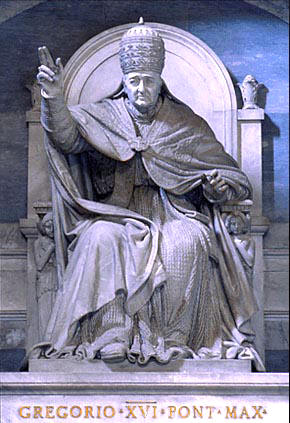 Gregory XVI has been pilloried as the pope who so hated modern developments that he would not allow railroads in his dominions! There is some truth in that. As a temporal ruler Gregory was reactionary--no doubt about it. But as a spiritual ruler Gregory carried on a pope's real work with distinction.
Gregory XVI has been pilloried as the pope who so hated modern developments that he would not allow railroads in his dominions! There is some truth in that. As a temporal ruler Gregory was reactionary--no doubt about it. But as a spiritual ruler Gregory carried on a pope's real work with distinction.
Bartolommeo Cappellari was born of a noble family at Belluno in Northern Italy on September 8, 1765. Against family opposition he entered a Camaldolese monastery in 1783, taking the name Mauro. Ordained a priest in 1787, he taught philosophy and theology to the young religious. In 1799 he wrote a defense of papal rights and papal infallibility. Pius VII made him abbot of St. Gregory's Monastery on the Coelian Hill, but when the French took over Rome, Cappellari retired to a Camaldolese monastery and once more taught philosophy.
Called to Rome by Pius VII after his restoration, Cappellari twice refused bishoprics. Leo XII made him a cardinal in 1825 and prefect of the Congregation for the Propagation of the Faith. In the conclave of 1830 Cardinal Giustiniani was the favorite, but when Spain vetoed him, the cardinals elected the pious Camaldolese Cardinal Cappellari. He took the name Gregory XVI.
Gregory XVI continued to live like a monk. It was his cross that, a simple pious religious, he was plunged into the vortex of a revolutionary storm which was rocking Europe. In the Papal States, revolutionists were triumphant in Bologna, and in Rome itself a rising was barely nipped in the bud. Unable with weak papal forces to put down the rebels, Gregory called on Austria, and Austrian bayonets restored order in Bologna. Jealous of Austrian intervention, the French seized Ancona. It took years to get the French and the Austrians out again. The Powers took this opportunity to read the Pope a lecture on government and to urge certain reforms on him. Gregory, however, could scarcely take seriously such requests from notorious despots like Metternich and Czar Nicholas I. Indeed, down to the last Gregory believed in ruling his States with a strong hand. Impatient with his own liberals, Gregory had little sympathy even for Catholic rebels like the Belgians and Poles. Yet he did what he could to soften the lot of the oppressed Poles, even speaking very bluntly to Czar Nicholas when that despot visited Rome. Gregory condemned the slave trade in 1839, and he adopted a sane policy of dealing with de facto governments which was to save much embarrassment for the Holy See.
In 1832 Gregory had the unpleasant task of condemning a number of errors connected with the brilliant Catholic periodical L'Avenir. He disliked doing this because the writers were great defenders of papal rights against statism. He also condemned a synthesis of Kantian and Catholic thought dreamed up by a Bonn professor named Hermes, and when another professor, Bautain of Strasbourg, attacked the proper sphere of reason, the vigilant Gregory condemned him.
Though Gregory suffered much from political troubles and from the persecution of his children in Spain, he enjoyed the consolation of seeing the Church win a great fight with Prussian bureaucracy in the mixed- marriage question.
Gregory XVI died June 9,1846.
Excerpted from "Popes
Through the Ages" by Joseph Brusher, S.J.

